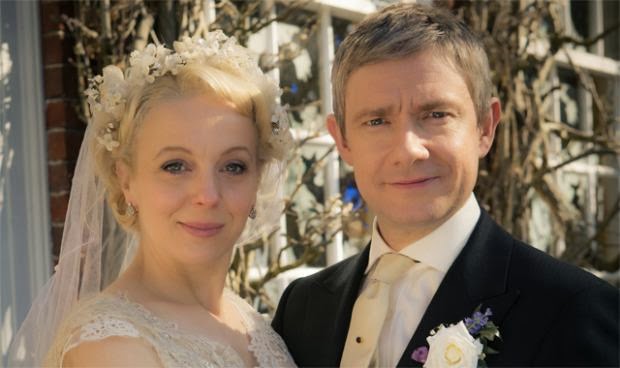A few caveats:
While I’ve scheduled this to go live after S3 of Sherlock finishes up in the US, there’s spoilers aplenty. You have been warned.
Yes, there’s lots to discuss about the end of S4 of Doctor Who and S3 of Sherlock. I want to focus on this aspect right now. And that aspect is the writing, not the acting. (I think all the parts mentioned are brilliantly acted.)
And yes, you should watch all the things I mention.
Donna Noble is quite literally the everywoman – a (barely) white-collar worker with a coarse accent and no aspirations. And yes, Russell T. Davies can’t leave well enough alone and shoves infinite superpowers into her character so that he can have his Big Season Finale!
But the superpowers are not what makes Donna Noble strong. She is a strong character from the first time we see her up to the end. She repeatedly calls a Time Lord on the carpet – and he backs down. She is a force to be reckoned with in her own right, simply because of her personality, upbringing, and force of will.
Donna Noble was – and is, once again – everyperson. She has no special training, no special skills. Her strength is strength of character. She puts it all together, figures it out with minimal prompting, and just adapts.
The addition of superpowers to Donna Noble lessens her, quite literally.
Then you have Mary Morstan Watson.
During the first 180 minutes of this series (season, whatever), she’s a refreshing change from the secondary roles – or worse, “dangerous women” roles – that women have been shoved into with Sherlock. She’s a strong personality – much like Donna. She doesn’t shirk danger, nor does she seek it out. She is smart, resourceful, and quick-witted. She stands up to our adorable “sociopath” (see footnote #3), sees right through his attempts at obfuscation, and is pretty much awesome.
And then.
And then we learn the truth.
Mary Watson isn’t anything like Donna Noble.
Mary Watson was superpowered all along.1
The showrunners of Sherlock fell into the “strong woman” trap that Neil Gaiman talked about so eloquently (tl;dr: A woman can only hit not-a-doormat levels if they’re physically formidible), and that’s quite bad enough sexist storytelling in and of itself.
But sexist (and racist, etc) writing is also bad writing… and the sexist underpinnings of having to make Mary a “strong” character is that it weakens the development of the male characters as well.
There’s a similar thematic element in both S4 of Doctor Who and S3 of Sherlock: Our protagonist is trying to come to grips with thier place in the world – and how dysfunctionally they relate to everyone around them.
Tennant’s Doctor struggles with guilt and a feeling of being responsible for and superior to everyone around him.2 Donna provides him a way to reconnect to regular people again, and when she is lost, we get the well-meaning (and tragically fumbled) events of “The Waters of Mars”. No matter how much I feel cheated by what Davies did to Donna (and I do) – at least it serves the thematic arc of Tennant’s Doctor.
Cumberbatch’s Sherlock is a self-proclaimed “high-functioning sociopath” – though he’s clearly not.3 That dichotomy is what powers Sherlock’s character growth throughout the entire show’s run so far. The arc of Sherlock starting to care enough about other people to make the effort to learn social skills is a major theme from S2E03 (“Reichenbach Fall”) and throughout all of S3. We see Sherlock learn to pay attention to Molly4, explicitly identify John as the thing he cares about most. Season three of Sherlock is where Sherlock starts to really learn how to identify with and interact with people, how to break away from the stereotype that Abed so skillfully destroys in S5E03 of Community.
And then.
And then we learn the truth.
Sherlock hasn’t been learning to relate to normal people at all.
Because they’ve all – John the resourceful war hero, Mary Watson and all her secrets, even Mrs. Hudson with her past worthy of an episode of Breaking Bad – been superpowered all along.
None of them are normal people.
They’re all superpowered, just like Sherlock is.
And the entire character arc of Sherlock Holmes through Season three crumbles under the temptation to make Mary Watson “stronger” than Donna Noble.
But no matter how many holes are shot in coins or men spontaneously offer baby names, neither Mary Watson nor The Woman is as strong a woman or as strong a character as regular, plain old Donna Noble.
And I miss her.
1 Yes, sooper-seekrit skillset counts as superpowers.
2 A trend which actually gets fulfilled – repeatedly – throughout Smith’s tenure.
3 Mycroft is perfectly aware of social norms, and doesn’t give a damn, but his younger brother is frequently clueless, which would point us more toward somewhere on the Asperger’s continuum. That he identifies as a sociopath says actually quite a lot about Sherlock’s relationship with Mycroft, and that’s hinted at throughout S3 as well.
4 And thank goodness she’s treated better this season.
#SFWAPro


i agree with you very much/ it was very interesting, and i miss donna too.